|

Realities of life through 'My Little Princess'
Title: My Little Princess
Author: W. A. Wijewardena
Published by Sarasavi Publishers
by Surekha Galagoda
In his maiden attempt as a short story writer W. A. Wijewardena,
Deputy Governor of the Central Bank discusses the realities of life
through various relationships be it between a teacher and student,
between lovers, between a bachelor or a married man and most importantly
between humans and their best friends, dogs.
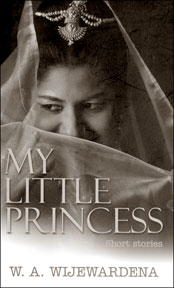 In
the story, My Little Princess, woven between a teacher and a student ,
he shows the true mentality of the Sri Lankan society, which cannot
accept a relationship between a man and woman to be asexual. They cannot
be friends, or companions. The society insults a relationship of this
nature adding spice to it. In
the story, My Little Princess, woven between a teacher and a student ,
he shows the true mentality of the Sri Lankan society, which cannot
accept a relationship between a man and woman to be asexual. They cannot
be friends, or companions. The society insults a relationship of this
nature adding spice to it.
The Poet and Princess is a short story between lovers who are made to
suffer be it in the slums or the palace. This is a normal hero, heroine
and villain type of story. It has a resemblance to "Princess" written by
Jean P. Sasson.
Four parallel lines describe the lives of four people and how a
series of events changes the lives of these four people. The underlying
message in this story is that there cannot be two kings in paradise. The
story is somewhat similar to "Eya Dan Loku Lamayek." The story also fits
with the old saying what goes around comes around, which is good advice.
The story Bachelor and the married man discusses how a bachelor and a
married man think of marriage. As the old saying goes, the people who
are in the cage wants to get out while the people who are outside wants
to get in.
This is a normal story where the man tells loads of lies about his
wife to justify his cause. This is typical human behaviour as the person
who does the wrong thing likes to justify his actions by blaming the
other party and the author takes great pains to describe it in detail.
The story has a sad ending, which explains that, all such relationships
end in disaster. It is a story which should be read by all married
couples.
The story Charcoal Hunter is woven around a family with only a girl
child who is loved and treasured like a gem and the maternal
grandfather. The girl as is typical in society finds a boy who cannot be
matched with her family but they both love each other at the beginning.
After sometime, showing the true colours of men he makes advances,
which she refuses. This results in the boy rejecting her and unable to
handle the pressure she becomes sick mentally.
The grandfather unable to see the precious granddaughter's suffering
goes to meet the boy who refuses to meet him and he gets to know that
the boy is having an affair with a married woman. All young girls should
read this story, which is well written, as it gives some good advice on
how they should behave in society.
The Loner and the Understanding Companion is a story about a man who
finds an understanding companion in a dog. Dogs are good listeners and
this helps him to understand his wife better which results in both of
them developing a healthy relationship and loving the four legged friend
very much but sadly they lose their friend due to the cruelty of
mankind.
This story would be better understood by animal lovers who know how
to love and care for the four legged friends. It is somewhat of a
tribute to all of them who gives a patient hearing and will not argue
even if we chase them away, but instead come with their tails wagging to
show their love and affection.
The writer, though he describes a lot of relationships is able to
keep the attention of the reader with his simple language. He sometimes
discusses sexuality in details but it is not vulgar by any means and
blends well with the story. Though there are a few grammatical errors
his attempt is commendable and may he have the time and strength to
write a novel.
W. A. Wijewardena the humble human being he is has showed his
simplicity in the short story collection too and showed us a different
talent, which he has apart from teaching and writing on Economics.
[email protected]
One writer, two languages
Title: In the Land of Nowhere
Author: R.S. Karunaratne
Published by Sarasavi Publishers
by Aditha Dissanayake
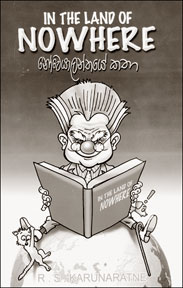 How
will you translate the Sinhala sentence Wenath ratawala menma,
Nowherelandthayeda thyagasheeli minissu, masuro ha yadinno sitiyaha?
into English. How
will you translate the Sinhala sentence Wenath ratawala menma,
Nowherelandthayeda thyagasheeli minissu, masuro ha yadinno sitiyaha?
into English.
What words would you use to describe yadinno, masuro and minissu? Or
better still how would you translate the simile "as poor as a church
mouse" into Sinhala? Where would you check to see if your answers are
correct? In The Land of Nowhere!
Yes, in the land situated in Nowhere, where Great Misers, day
dreamers, talking birds, goldsmiths, and beautiful girls live you will
find the answers; for each story in this collection of modern fables by
R.S. Karunaratne, is written in Sinhala as well as in English and will
be of great use to students of translation methods as well as to those
who wish to improve their bilingual skills.
Taking into account a number of constraints, including context, the
rules of grammar of the two languages, their writing conventions, and
their idioms that are important in a literary translation, the author
proves that when it comes to translating a newspaper editorial, a
political speech, or a book on almost any subject, one has to have not
only the craft of good language skills and research, but substantive
knowledge of the pertinent subject and culture, and of the art of
writing, itself.
Even though a 17th Century French critic is said to have coined the
phrase "les belles infideles," to suggest that translations, like women,
could be either faithful or beautiful, but not both at the same time,
the stories in Nowhereland prove this to be wrong.
For, in these stories the writer has accurately rendered the meaning
of each text from Sinhala to English or vice versa, without adding to or
subtracting from the plot, and without intensifying or weakening any
part of the meaning.
Here are translations, which are transparent to such an extent a
native speaker of Sinhala or English would read the translated version
as if they are reading the original text and not a translation.
With every story conforming to the target language's grammatical,
syntactic and idiomatic conventions, Land of Nowhere is the kind of book
Vladimir Nabokov would have approved.
[email protected]
Distinct moral lessons
From the Jataka Stories:
by D. P. L. Walter Silva
The Jataka Stories are a popular facet of Buddhist culture. From the
beginning of their history the stories were known to the monks and they
passed them down to the people through their Poya sermons (Bana).
The inspired devotees in turn took them home and retold them to their
children. The simple children seated around them in their humble mud
huts heard the stories with wide-eyed wonder. The tales of Bodhisatva's
selfless actions, his compassion and love touched them deeply and the
cruel machinations of the Devadatta filled their small minds with a
sense of anger.
Thus were the Jatakas dispersed and thus did they spread among the
people. But how many of them knew their history? Save the monks, perhaps
none. What then are these Jataka stories?
A Jataka or birth story briefly is a story of a Parami
(transcendental virtue) performed by a Bodhisatva (Buddha Aspirant) to
qualify for Buddhahood. Gautama performed many diverse such deeds in his
countless previous births as Bodhisatva.
These stories appear in the archaic Pali work the Jatakaththavannana
(Pansiya Panas Jatakaya-Sinhala). This compendium contains 550 birth
stories of Gautama Buddha.
They constitute the tenth book of the Kuddhaka Nikaya (Smaller
Collection) of the Sutta Pitakaya in the Tripitaka.
In 1961 Prof. Viggio Fausboll discovered a manuscript of the Jatakaya
in the Royal Danish Library in Copenhagen. In 1867 his six volume
translation of the work in Roman script was completed. Later it was
rendered into English by Prof. Cowell. This work stimulated considerable
interest among oriental scholars of the time.
The Buddha remembered all his past birth incidents and also possessed
the ability to recall them using his super-normal power (Abhinna) which
according to the Buddhist doctrine is 'Pubbe Nivasanussatinana'
(Anamnesis) possessed only by enlightened beings.
'A Buddha knows what happened to him in every existence.... and the
Buddha was accustomed to explain to his disciples things that were
happening by things that happened countless ages ago,' writes Max
Muller.
The recollection of a relevant past birth incident (Paccuppannavathu
- Pali) which was often induced by the questions of his disciples formed
the core of the Jataka tales (Athithavithu - Pali).
The unique feature of a Jataka story is its introductory verse (Adisambuddha
Gatha) which the Buddha himself had recited after attaining Buddhahood.
These Gathas, couched in more archaic Pali, are older than the stories.
They spell out briefly the moral of the story before it is narrated.
The Jatakas, therefore, are not just rambling tales told merely to
amuse an audience but tales whose purpose is purely didactic. They teach
a distinct moral lesson by dramatization of incidents figuring
Bodhisatva as the hero.
The ten transcendental virtues, (Parami) which form the Buddhist
moral code, are symbolically illustrated in the Jatakas. The ten 'Parami'
are; Generosity, Morality, Renunciation, Wisdom. Energy, Patience,
Truthfulness, Determination, Loving Kindness and Equanimity. The Buddha
used the Jatakas along with Suttas and Gatha to instruct, guide and
inspire his disciples.
Jatakas of varying lengths are incorporated in the Jataka Book. The
shorter Jatakas approximate the fable where the Bodhisatva appears as an
animal. The longer stories have plots like the present short story. In
all these tales the Bodhisatva is the hero except in a few where he is a
spectator like the tree sprite (Ruksha Devatava) in the Gangayya
Jatakaya.
In the classical Buddhist literature called 'Navanga' some tales
appear under the heading Jatakam. In these the Buddha is not identified
in his past births as animal. He was instead portrayed as a great sage
or teacher as the mark of devine respect for him, the Thathagata. These
original Jatakas belonging to an earlier period do not appear in the
Jathaththavannana.
While the moralistic intention of the Jatakas, as explained before,
are quite explicit, it could also be inferred that they are established
upon the Laws of Rebirth and Karma which are important components of the
Buddhist doctrine.
The Buddha's ability to recall 'his past life incidents in his
present existence' explains the Law of Rebirth, and the 'Buddhisatva
becoming what he makes of himself in his past lives' expound the Karmic
force.
The Buddha left no written records of his teachings. His disciples
who knew them well dispersed them orally to posterity. About three
months after his death the compilation of the Pali Tripitaka which
includes the Jataka stories was started by His pre-eminent Arahats.
Continued next week
Daily News presents:
An Anthology of Short Stories
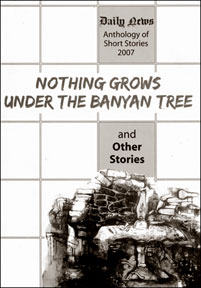
|
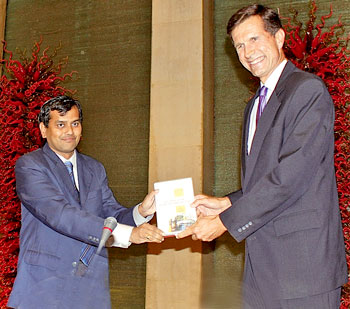
Pramod de Silva, Editor of the Daily News presents a copy of
Nothing Grows Under the Banyan Tree to Robert Blake, Ambassador
of the USA. |
The maiden Anthology of Short Stories compiled by the Daily News
titled Nothing Grows Under the Banyan Tree was launched at the Cinnamon
Grand Hotel on October 31, with Robert Blake, the Ambassador of the USA
as the Chief Guest while Minister Anura Priyadharshana Yapa graced the
occasion with his presence. The key-note address was made by Dr. Tissa
Abeysekara.
The anthology is the materialisation of a concept of the incumbent
Chairman, Associated Newspapers of Ceylon Limited, Bandula Padmakumara,
with the intention of rekindling the art of short story writing in the
arena of Sri Lankan English literature.
Edited by Malani Govinnage, Deputy Editor of the Daily News, the
twenty-four stories in the book have been selected out of more than 300
entries in response to an advertisement placed in the Daily News and the
Sunday Observer in the beginning of July this year.
In addition, the stories published in the Creative Writing page of
the Daily News this year were also considered by the panel of judges and
two of these stories have been included in the anthology.
A prolific visionary
Ode to Doris Lessing
Winner of the Nobel Prize for Literature (2007):
by Jegatheeswari Nagendran
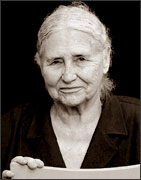 Champion
of downtrodden ones Champion
of downtrodden ones
With no hope of redemption...
One-time feminist, One-time Communist,
You became the Icon
Of innocent victims old and young
Caught in the claws of injustice
And corruption and criminals
Carrying guns, killing people.
You are a prolific visionary
Who spoke with an ardent, fearless tongue...
Writing for nearly sixty years,
With integrity and passion.
Every word written by your own hand;
You never used a typewriter or computer;
You've been awarded "every bloody prize
In Europe & Britain," as you so brightly said!
You have millions of admirers almost everywhere...
There might be detractors, malicious and rare,
For envy Makes the Losers make remarks unfair.
Now an unknown woman poet
From an Indian Ocean Isle,
Has found a kindred spirit in you,
A great celebrity; this will make you smile!
Despite your fame and brilliance
As authentic Queen of Modern English Literature,
You never became a boring, pompous academic,
Full of self-importance.
Born in PERSIA, now IRAN, You grew up in AFRICA...
Observing, then describing
Oppression of the natives;
Vile deeds perpetrated by your own
White people who practise APARTHEID.
Finally compelled to leave,
You went with your son to England,
Where you live, still writing and inspiring us,
Never giving up or giving in. |
